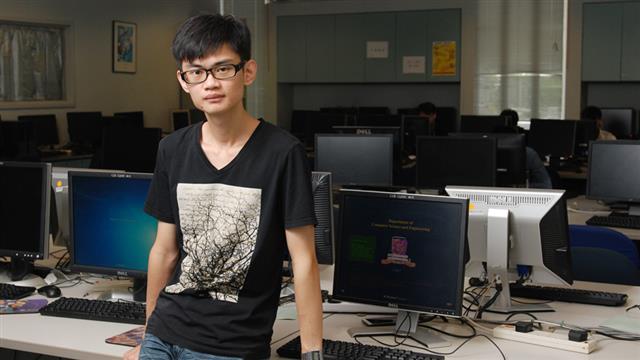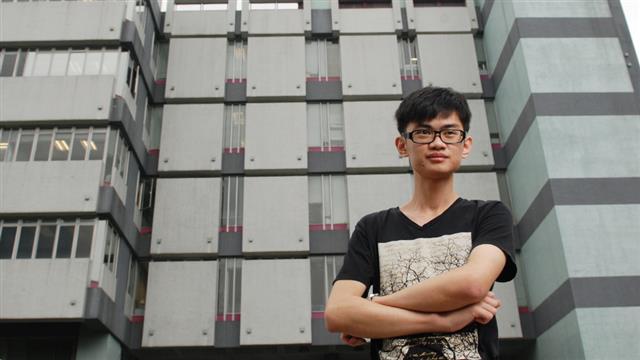With the support of the Pi Centre, Tsang Ka-chun founded his mobile phone game company, 'C4Cat'. Dynamix, the company's first game, was on sale in Google Play on 30 October and soon came out second on the sales list.
How long have you been playing electronic games?
I have been playing for nine years. That makes me a junior player in our team.
What triggered you to start a business?
My family did not have any spare money for me to spend on toys. I developed my interest in making my own toys with available materials. As electronic games grew popular, I started to learn skills such as programming and drawing illustrations in order to make my own games. I designed my first electronic game by making alterations to a calculator.
During the process of learning, I got to know some young people. They wanted to join the creative industry but it was very difficult, resulting in a shortage of manpower in the field. Electronic games is a part of the creative industry. I hope to contribute in my own way and regain the confidence and support of investors.
Launched in 2012, the mobile phone game, Puzzle and Dragons, received overwhelming response and made great profit. Having observed that mobile phone games do not need wholesalers and physical shops, unlike traditional electronic games, I decided to go into the business.
What is the composition of your staff? How did you come to form a team?
My company has five full-time staff and five part-timers, including myself. Some of them were classmates from secondary school and a higher diploma course at CUHK's School of Continuing and Professional Studies. The rest of them are gamer friends and members from electronic games clubs. I selected them based on their passion in designing games which is critical for team work.
Why music games?
We planned to design a massive electronic game at the beginning. Due to technical and resource limitations, we modified it to a medium-sized game. It was also a good opportunity to test our ability to cooperate and hone our skills in advertising and wholesale. Players tend to play different music games at the same time. It is easier for us to get a share in the highly competitive market. Moreover, Hong Kong has many potential composers, for whom our games will provide a platform to release their work. It's a way to support local creativity.
Any frustration encountered?
The greatest frustration came from my parents who disapproved of my decision. They said, 'How many Steve Jobs can there be?' Now, with the performance of the company as evidence, they are more accepting of my choice.
How will you develop your business?
Dynamix is designed with the goal of attracting as many players as possible. We will keep modifying it. In addition, games targeted at higher profits will be designed.
What support have you received from the Pi Centre?
The centre provides office space for us to work together. We also received knowledge about entrepreneurship, including how to start a company and business registration. The Pi team helps us to move to the Hong Kong Science and Technology Parks.
How do you divide your time between work and study?
The ratio of time spent on study and on work is 3:7. My work often allows me to apply knowledge before actually learning it in the classroom, so I don't have to spend too much time for revision. But there were challenges too. The launch date of Dynamix coincided with my mid-term exams. I even had two exams on the same day. As I didn't have enough time to study for both, I finished the first exam in half the time allocated and used the remaining time to prepare for the following exam. But so far I am handling work and studies quite well.
Have you thought of dropping out of university to focus on your enterprise?
I have set a profit target for my company. Once that target is reached, I will seriously consider giving up school.
What is your plan after graduation?
I will fully engage in the creative industry. I hope to host lectures or workshops to share my experience with those who plan to join the business.
Do you have a few words of advice for peers looking to have their own start-ups?
They should be clear about what they want to do. They should be positive──there are always ways to solve technical problems. Students have nothing to lose and no financial burden. Why not be more aggressive?





